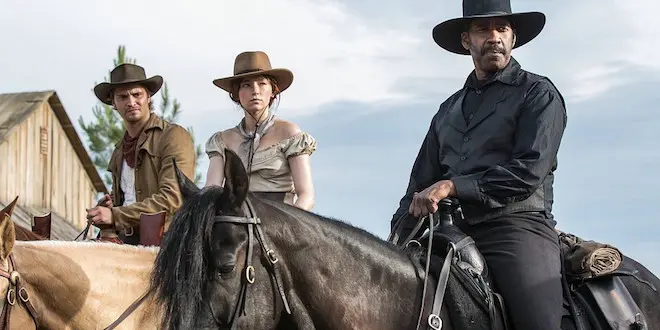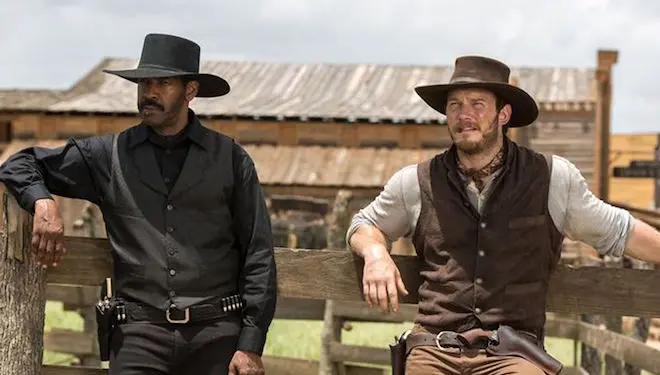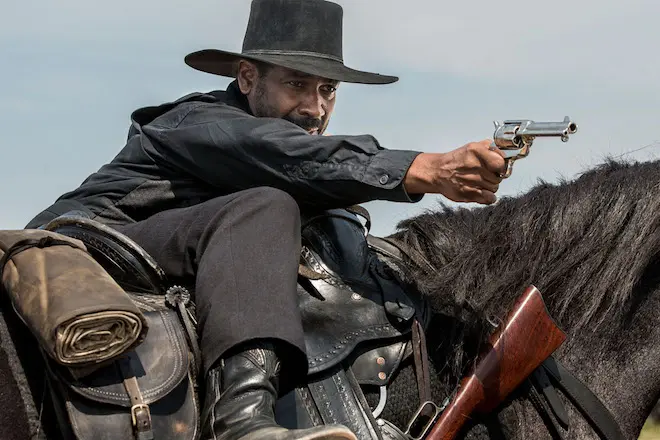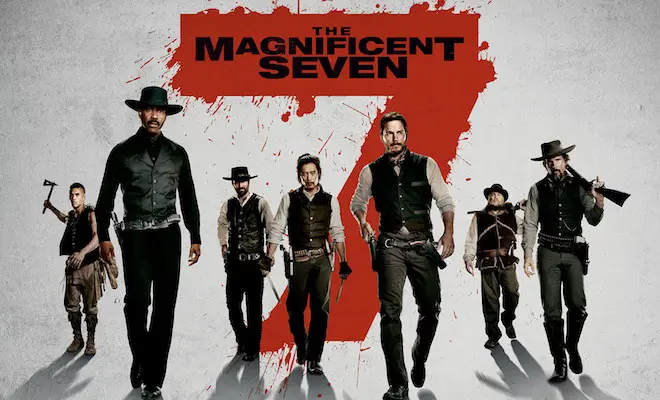The Magnificent Seven is not a new idea. It’s a remake, of a remake, of a few remakes, based off a legendary Japanese movie about samurai, directed by one of the greatest filmmakers of all time. Because the story has such a deep tie to several projects that have come before it, up to and including the comedic classic, Three Amigos, the made-to-capitalize-on-Star–Wars film, Battle Beyond The Stars, and even one of Pixar’s earliest films, A Bug’s Life, it is best to give the new Antoine Fuqua film its due by not comparing it to what came before, and judging it solely on its own merits.
The Magnificent Seven is the story of small western farming town in 1879 called Rose Creek, which happens to be settled close to a gold mine. A robber baron named Bart Bogue (Peter Sarsgaard) has essentially taken over the town for his own purposes of mining, using hired guns and mercenaries, and the farmers fear for their lives from the megalomaniacal baron. When Bogue offers to “buy” the town, a parcel at a time, for a ridiculously low price, essentially forcing the farmers to accept or die, a young widow named Emma Cullen (Haley Bennett), whose husband (Matt Bomer) was shot dead by Bogue when he protested, gathers as much money as she can to go out and hire an army of mercenaries of her own to protect her town and rid them of Bogue once and for all.
Emma stumbles upon a bounty hunter named Sam Chisolm (Denzel Washington), a man with a complicated, and tragic past. Sam sees something familiar in young Emma, and offers to help, even though her reward is much less than he’d usually take. Sam and Emma meet up with Josh Faraday (Chris Pratt), a gambling wisecracker who happens to be good with card tricks and six-shooters. Faraday joins up — more for the adventure, and the opportunity to blow stuff up — than the money, and Chisolm sends him off to recruit another old friend, Goodnight Robicheaux (Ethan Hawke), an old Civil War buddy. Goodnight just happens to hang around with an Asian assassin named Billy Rocks (Byung-hun Lee), and both men decide to heed the call of Sam Chisolm and join the gang.
On the flip side, Sam and Emma recruit a Mexican outlaw named Vazquez (Manuel Garcia-Rulfo) and a wily, bear-of-a-man tracker namer Jack Horne (Vincent D’Onofrio). The six men — and Emma Cullen — then head off to Rose Creek to deal with the Bogue problem when they are happened upon by a Comanche warrior named Red Harvest (Martin Sensmeier), who has been cast out from his tribe and decides to join Chisolm’s group. And now with a group of seven unique fighters, with different skin colors, social backgrounds, and motivations, Sam Chisholm and company set off for Rose Creek and their destiny.

Byung-hun Lee, Manuel Garcia-Rulfo, Ethan Hawke, Denzel Washington, Chris Pratt, Vincent D’Onofrio and Martin Sensmeier.
The Magnificent Seven does a good job of getting to the action quickly, and it avoids any true lull. The film is paced exceptionally well — even with its two-hour and 12-minute run time, and it never drags. This is attributed to director Antoine Fuqua and his ability to juggle action and pacing better than most filmmakers. His recent films like Southpaw and The Equalizer were also paced well, and seeing Antoine Fuqua’s name attached to a film pretty much tells you that you won’t be bored.
The script by Nic Pizzolatto (True Detective) and Richard Wenk (The Equalizer), based off the original Seven Samurai story by Akira Kurosawa and Shinobu Hashimoto and Hideo Oguni, does a decent job of giving each character some reason for being. There is some slight comedy, usually from the banter between such macho men, and by Chris Pratt opening his mouth, but, thankfully, The Magnificent Seven never begins to feel like a comedy.
The ties that Chisolm has for each of his friends is only subtly hinted at and is not forced exposition. Even smaller characters, like Jack Horne and Red Harvest, have a good foundation of backstory to explain why they would be risking their lives for a bunch of strangers. There is just enough story here to frame the massive gunfights, and the subtle way that Chisolm’s backstory is revealed pays off in the end in a satisfying way.
The action in The Magnificent Seven comes from epic gunfights, whether it’s one man in a saloon full of thugs, or in the dirt streets of a town full of hired guns, or the climatic battle for Rose Creek, which sees Bogue’s army of 200 men against Chisolm’s group of seven and a ragtag collection of farmers fighting for their livelihoods. The gun fights are never too chaotic, and the audience is never left trying to differentiate the good guys from the bad, or trying to decipher which side story is being resolved — and trust me, each man has a past, and most are somehow resolved during the gunfight. You can’t have a western without a good gun fight, and The Magnificent Seven delivers in spades.
Taken as its own film, and not tied to the many, many versions that have come before, Fuqua’s The Magnificent Seven is a solid western, with a strong cast and a good script. Washington and Pratt don’t overshadow their compatriots, and it truly feels like an ensemble film. “Magnificent Seven” is not a high enough film score for this film, so I give it a solid 8.2 out of 10, or on a five-point scale, four out of five stars.
The Magnificent Seven is rated PG-13 and is in theaters now.






